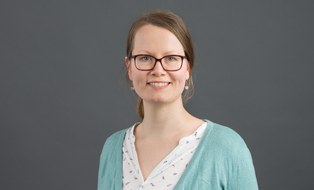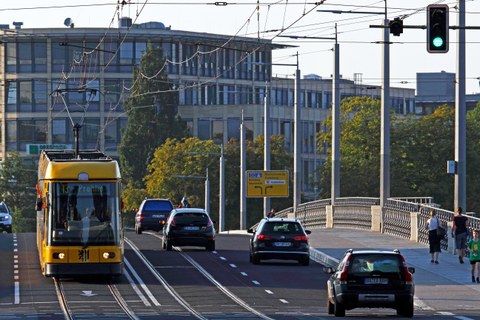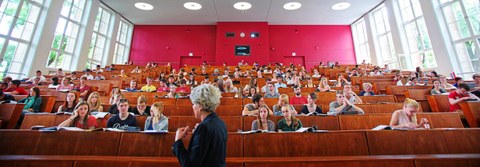Transportation Economics (Master)
| Abschluss: | Master of Science |
| Regelstudienzeit: | 4 Semester |
| Studienbeginn: | Wintersemester |
| Studienform: | Direktstudium (Vollzeit/Teilzeit) |
| Zulassungsvoraussetzungen und Eignungsfeststellung: |
Erforderlich ist ein erster in der Bundesrepublik Deutschland anerkannter berufsqualifizierender Hochschulabschluss bzw. ein Abschluss einer staatlichen oder staatlich anerkannten Berufsakademie auf dem Gebiet der Verkehrs- oder Wirtschaftswissenschaften bzw. aus dem MINT-Bereich (Mathematik, Informatik, Naturwissenschaft und Technik) oder ein Abschluss in einem sonstigen Studiengang mit inhaltlich stark quantitativer Ausrichtung. Darüber hinaus sind besondere Kenntnisse in den Bereichen Volkswirtschaftslehre, Betriebswirtschaftslehre und quantitative Verfahren (Mathematik, Statistik, Ökonometrie, Operations Research, Programmierung, Data Analytics) erforderlich. Zudem werden Englischkenntnisse auf dem Niveau B2 des Gemeinsamen Europäischen Referenzrahmens für Sprachen vorausgesetzt. Nachweis der besonderen Eignung zum Studium nach Eignungsfeststellung |
| Bewerbungsfrist: | 1. Juni bis zum 15. Juli (für EU-Bewerber) 1. April bis zum 31. Mai (für Nicht-EU-Bewerber) |
| rechtlich verbindliche Informationen | Studiendokumente |
| Bewerbung: | Online-Bewerbungsportal |
|
Achtung: |
Die besondere Eignung für den Masterstudiengang Transportation Economics liegt dann bei Ihnen vor, wenn Sie den Erwerb von mindestens sich inhaltlich nicht überschneidenden 60 Leistungspunkten (ECTS) aus den Fachbereichen Betriebswirtschaftslehre, Volkswirtschaftslehre und quantitative Verfahren (Mathematik, Statistik, Ökonometrie, Operations Research, Programmierung, Data Analytics) nachweisen können. Dabei müssen Sie aus den Fachbereichen:
- Betriebswirtschaftslehre,
- Volkswirtschaftslehre und
- quantitative Verfahren
jeweils mindestens 15 sich inhaltlich nicht überschneidende Leistungspunkte, sowie 15 sich inhaltlich nicht überschneidende Leistungspunkte in beliebiger Kombination aus den Fachbereichen Betriebswirtschaftslehre, Volkswirtschaftslehre und quantitative Verfahren nachweisen. Weisen Sie insgesamt mehr als 30 sich inhaltlich nicht überschneidende Leistungspunkte in quantitativen Verfahren nach, können in gleichem Umfang die geforderten Leistungspunkte für Betriebswirtschaftslehre um bis zu 10 Leistungspunkte und die geforderten Leistungspunkte für Volkswirtschaftslehre um bis zu 5 Leistungspunkte reduziert werden.
Den Nachweis der besonderen Eignung prüft der Zugangsausschuss anhand der dem Antrag beigefügten Unterlagen. Grundvoraussetzung für die Zulassung zum Masterstudiengang Transportation Economics ist, dass Sie die Zugangsvoraussetzungen gemäß § 2 der Eignungsfeststellungsordnung (englische Version: hier) erfüllen. Welche Unterlagen einzureichen sind, steht ausführlich beschrieben im § 4 Abs. 2. Bitte informieren Sie sich. Zudem ist mit den anderen Unterlagen auch der unterschriebene "Antrag auf Feststellung der besonderen Eignung" einzureichen.
Die Gestaltung von Mobilität ist eine der großen Herausforderungen einer Gesellschaft. Sie bestimmt die Teilhabe an sozialen und wirtschaftlichen Aktivitäten, die Umweltwirkungen von Verkehr und die räumliche Struktur von Wirtschaft und Gesellschaft. Zugleich stehen Verkehrsmittel, Infrastrukturen, die Organisation und Finanzierung von Mobilitätsleistungen vor weitreichenden Veränderungen durch web-basierte Plattformen, Internethandel, Abkehr von fossilen Energieformen, Entwicklung autonomer Fahrzeuge sowie Verfügbarkeit von großen und heterogenen Datenmengen (Big Data). Dies impliziert eine Reihe von verkehrswirtschaftlichen Fragestellungen sowohl auf betrieblicher als auch gesellschaftlicher Ebene.
Der Masterstudiengang Transportation Economics vermittelt Ihnen gezielt wissenschaftliche Methoden und Handwerkszeug zum Verständnis, der Bearbeitung und Lösung der sich ergebenden verkehrswirtschaftlichen Fragestellungen.
Klar ausgerichteter Verkehrs- und Wirtschaftsbezug
Das Masterstudium hat einen klar ausgerichteten Verkehrs- und Wirtschaftsbezug. Es vermittelt Ihnen international anerkannte Methoden im Bereich der Analyse und Bewertung, Datenerhebung und -auswertung sowie Programmierung und Modellierung mit Bezug zu allen Verkehrsträgern. Aktuelle Entwicklungen und Zukunftsperspektiven werden übergreifend und spezifisch betrachtet und darüber hinaus in den jeweiligen Spezialisierungen vertiefend diskutiert. Vor allem in den Seminarkursen wird individuell auf die Interessenschwerpunkte der Teilnehmenden eingegangen.
Vermittlung von Methodenkompetenz
Das Studienangebot erlaubt Ihnen, sich umfangreiche Methodenkenntnisse anzueignen. Dies eröffnet Ihnen ein breites Berufsspektrum, das durchaus über den Verkehrsbereich hinausgehen kann. Dies betrifft insbesondere Tätigkeiten, die umfangreiche quantitative Kenntnisse, z. B. im Bereich Datenanalyse, erfordern.
Durchgehend in englischer Sprache
Durch die durchgehende Präsenz der englischen Sprache werden Sie hervorragend für den nationalen und internationalen Arbeitsmarkt qualifiziert. Sie besitzen fremdsprachliche, insbesondere englische Sprachkompetenz, können fachliche Texte in Englisch verfassen und Vorträge in englischer Sprache halten. Die internationale und englischsprachige Ausrichtung des Studienangebotes sowie die Zusammenarbeit in Projektgruppen befähigt Sie zudem zur interkulturellen Zusammenarbeit.
Das englischsprachige Studienangebot bietet insbesondere für Studieninteressierte aus dem Ausland einen leichten Zugang zum Studium an der TU Dresden.
Berufspraktikum bringt Praxiserfahrung im Studium
Viele Studierende interessieren sich im Laufe ihres Studiums für ein Berufspraktikum, um Eindrücke in der Praxis zu sammeln, ihre Kenntnisse aus dem Studium anzuwenden und sich für den Berufseinstieg zu positionieren. Häufig kollidiert dieser Wunsch jedoch mit dem Studienablauf, da die notwendige Zeit für ein Praktikum nicht vorgesehen ist und es sich nicht in der Vergabe von Leistungspunkten niederschlägt. Wir finden es jedoch wichtig und richtig, dass unsere Studierenden Berufspraxis sammeln. Deshalb können Sie im Studiengang ein Berufspraktikum als Modul wählen. Damit haben Sie die Möglichkeit, schon während des Studiums Erfahrungen in der Berufspraxis zu sammeln, ohne dafür das Studium verlängern zu müssen.
Im Studiengang werden Ihnen fünf verkehrswirtschaftliche Spezialisierungen angeboten (Modulgruppe Spezialisierungen), von denen Sie zwei wählen müssen. Diese Spezialisierungen vermitteln Ihnen verkehrswirtschaftliche Inhalte und Kompetenzen.
Die fünf Spezialisierungen sind:
- Computational Logistics: Inhalte sind analytische Methoden zur Problemlösung und Entscheidungsunterstützung in Verkehrs- und Logistikunternehmen sowie zum Management von Transportsystemen und -dienstleistungen.
- Transport Policy: Inhalte sind ökonomische und ökonometrische Methoden zur Analyse einer Vielzahl verkehrsökonomischer und verkehrspolitischer Fragestellungen (z. B. zu Emissionen, Stau, Lärm oder Sicherheit) sowie die Entwicklung und Bewertung adäquater verkehrspolitischer Maßnahmen.
- Spatial and Environmental Economics: Inhalte sind ökonomische und ökonometrische Methoden zur Analyse der räumlichen, ökonomischen und umweltbezogenen Wirkung von Mobilität in Städten und Regionen sowie die Evaluation und Entwicklung von relevanten Politikinterventionen zur Verbesserung der räumlichen Allokation und der Reduktion von negativen Umweltfolgen des Verkehrs.
- Statistics: Inhalte sind Verfahren der multivariaten Statistik. Es erfolgt sowohl eine Darstellung der theoretischen Grundlagen, als auch die Anwendung der Verfahren auf Daten aus Verkehr und Wirtschaft.
- Data Analytics in Transportation: Inhalte sind Methoden der Datenanalyse und deren Anwendung, die u. a. für die Erstellung und Auswertung von Umfragen und Experimenten sowie die Bearbeitung strukturierter und unstrukturierter verkehrsbezogener Daten (Big Data) im Verkehrsbereich relevant sind.
Die verkehrswirtschaftlichen Kompetenzen können Sie über Ergänzungen vertiefen und erweitern. Sie können hier nicht nur aus verkehrswirtschaftlichen Modulen wählen, sondern haben auch Zugang zu Angeboten der Wirtschaftswissenschaften und des Verkehrsingenieurwesens. Darüber hinaus besteht für Sie die Möglichkeit, Fremdsprachenkompetenz zu erwerben oder ein Berufspraktikum in den Studienablauf zu integrieren. Damit bietet Ihnen dieser Studiengang ein hohes Maß an Flexibilität. Sie können Ihre individuellen Vorstellungen, Wünsche und Interessen in der inhaltlichen Studienplanung in hohem Maße berücksichtigen.
Das Studium sieht im 3. Fachsemester ein Mobilitätsfenster vor. Dieses können Sie für den Besuch einer anderen Hochschule im Ausland oder für ein Berufspraktikum nutzen. Dabei können Sie bis zu 30 ECTS aus Modulen einer ausländischen Hochschule einbringen.
Die Nachfrage nach gut ausgebildeten Verkehrswirtschaftlern ist in vielen Ländern und bei international tätigen Firmen und Organisationen groß. Deshalb gewinnen multikulturelles Verständnis, interkulturelle Zusammenarbeit und eine sichere Beherrschung der englischen Sprache immer mehr an Bedeutung. Angesichts der zunehmenden Relevanz von Daten werden zudem neben der ökonomischen und betriebswirtschaftlichen Qualifikation zukünftig auch Fähigkeiten im Bereich der Data Analytics sowie Schlüsselqualifikationen im Bereich der Interdisziplinarität gefragt sein.
Als Absolventin/Absolvent des Masterstudiengangs Transportation Economics besitzen Sie ein breites verkehrs- und wirtschaftswissenschaftliches Wissen, umfangreiche Kenntnisse wissenschaftlicher Methoden sowie eine hohe Kompetenz zu Abstraktion und Transfer. Dies befähigt Sie in besonderem Maße dazu, nach entsprechender Einarbeitungszeit in der Berufspraxis, vielfältige und komplexe Aufgabenstellungen im Rahmen leitender Tätigkeiten mit Bezug zu den Themen Mobilität, Verkehr, Logistik und Datenanalyse in Unternehmen, nationalen und internationalen Organisationen, öffentlichen Verwaltungen, Verbänden, Politik und Politikberatung sowie Forschungs- und Lehrinstitutionen erfolgreich zu bewältigen. Aufgrund Ihrer ausgeprägten methodischen Kenntnisse können Sie schnell auf Anforderungen und Veränderungen der Berufswelt reagieren.
Darüber hinaus wird durch das Studium die Basis für eine weiterführende wissenschaftliche Qualifikation geschaffen, beispielsweise eine Dissertation im wirtschaftswissenschaftlichen Bereich.
Die kontinuierliche Schulung englischer Sprachkenntnisse runden Ihren Kompetenzerwerb im Laufe des Studiums ab. Ihre Befähigung zur interdisziplinären Zusammenarbeit steht angesichts der inhaltlichen Ausgestaltung des Studienganges und der Verknüpfung zu den Fachbereichen Wirtschaftswissenschaften und Verkehrsingenieurwesen außer Frage.
Als Absolventin/Absolvent des Masterstudiengangs Transportation Economics sind Sie damit exzellent auf die beruflichen Herausforderungen der Zukunft vorbereitet.
Wissenschaftlicher Studiengangskoordinator / Fachberater
 © Michael Kretzschmar
© Michael Kretzschmar
Studiendekan Verkehrswirtschaft
NameProf. Dr. rer. pol. habil. Jörn Schönberger
Eine verschlüsselte E-Mail über das SecureMail-Portal versenden (nur für TUD-externe Personen).
Studentischer Studiengangskoordinator
Studentischer Studiengangskoordinator
NameHerr Nicolas Reuter
für den Masterstudiengang Transportation Economics
Eine verschlüsselte E-Mail über das SecureMail-Portal versenden (nur für TUD-externe Personen).
Anfragen zu Prüfungsangelegenheiten
 © Privat
© Privat
Frau Katrin Lindner, Prüfungsamt Verkehrswissenschaften
Eine verschlüsselte E-Mail über das SecureMail-Portal versenden (nur für TUD-externe Personen).
Besuchsadresse:
Hülße-Bau, Nordflügel, 1. Etage, Raum 109 Helmholtzstraße 10
01069 Dresden
Postadresse:
Technische Universität Dresden Bereich Bau und Umwelt, Studienbüro, Prüfungsamt Verkehrswissenschaften
01062 Dresden
Öffnungszeiten:
- Dienstag:
- 09:00 - 11:00
- 13:00 - 17:30
- Donnerstag:
- 09:00 - 11:00
- 13:00 - 15:00
Änderungen der Sprechzeit s. Aktuelles
Zentrale Studienberatung
 © Michael Kretzschmar
© Michael Kretzschmar
Dipl.-Psych. Franziska Klinkewitz
Eine verschlüsselte E-Mail über das SecureMail-Portal versenden (nur für TUD-externe Personen).
Besuchsadresse:
Fritz-Foerster-Bau, Etage 0, Raum E65 Mommsenstraße 6
01069 Dresden


